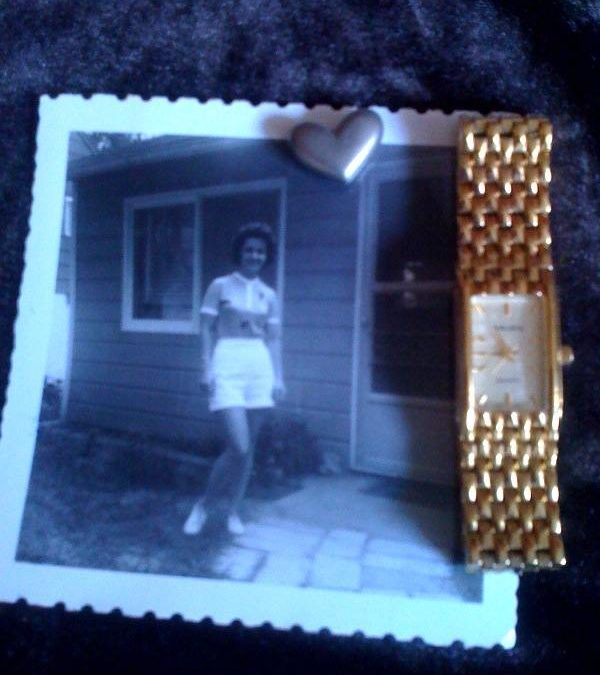Quite a few years ago, on my routine visit to my great Aunt Lydia in Brooklyn, she surprised me with an unusual request. She usually regales me with all her fascinating stories of life in New York during the 40s and 50s as an amateur dancer and regular hell-raiser/party thrower in the 60s. This time she asked me, in her usual frank way, if I would like some of her jewelry and/or other tchotchke to take home. Aunt Lydia, looking heavenward, said “Well I ain’t taking my stuff with me, you know.” Basically she suggested that me (and my sisters) take whatever we wanted since she was going to go through her possessions and try to sort and pare things down. These would be our heirlooms. Now, of course this made me somewhat uncomfortable thinking about her death, but it did make sense that she was trying to organize her possessions and give most of them away. I took a simple gold watch and some fabulous pictures of her. Thanks Aunt Lydia.
Unfortunately, she died only a year later. Her granddaughters were her executors of her estate (which wasn’t much) and it was fairly easy for them to go through her remaining possessions and tie up loose ends. Aunt Lydia, in her precious way, made it easier for her family to deal with her death. We still and always will miss her, her generosity and her wonderful stories about growing up in New York City back in the day.
Although Aunt Lydia was wise to start thinking about the fate of her possessions upon her death, this is not always the case with most elderly people. As a professional organizer, I often get to see people’s home and their possessions. I can’t imagine how difficult it must be in one’s advanced years to start contemplating about the end of life. And to then have to sort/purge through all of one’s stuff? Too much to think about… I’ll be gone so does it really matter anyway?
But life continues for those left behind. After funerals are done and tears are shed, many adult children must then go through their deceased parents’ possessions. Hopefully, a will was written and all the major items (and money) have been assigned to new owners.
However, many small items are left behind in limbo so to speak: Wardrobes, personal letters, costume jewelry, home décor, and other items that usually need to be sorted. assigned new homes or donated. I have two friends, who recently lost parents, who then wound up dedicating many of their weekends to sorting and purging their parents’ possessions with their siblings. Not only is it a lot of physical work, but trying to figure out what Mom would have wanted done with all her rosary beads only adds to this exhausting task.
It would be prudent to have a discussion with elderly loved ones and see if possessions can be sorted, assigned or hopefully pared down before they pass. You might meet with some resistance, so start with small projects and work form there. Oftentimes, it is helpful to hire a professional organizer to help with these tasks. These professionals are knowledgeable and sensitive, yet remain emotionally neutral when it comes to dealing with sorting and paring down people’s stuff. Professional organizers have great connections and relationships with charities and tangent industries (e.g. junk removal companies). When going through this process with an elderly loved one, it might be wise to also consider one’s own possessions as well.
When they are old enough, I will let my nephews know that my organs and all my possessions can be donated, with a couple of exceptions. I hope that they will take Aunt Lydia’s watch, a diamond necklace from my deceased stepmom and my guitar (hope that one of them plays it better than me.)
|



Follow Us!